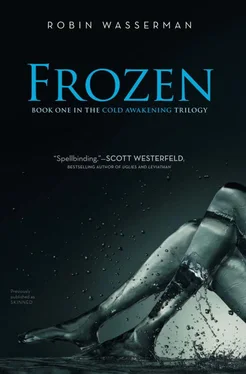I suspected it was because, like me, she loved to run. Missed it, missed the uniforms and the competitions and the trophies and even the outdoors. I could imagine myself doing the same thing—except, of course, that I was destined for productivity. Let my spouse, whoever he turned out to be, ply his hobbies. I’d been informed from day one—still in diapers, spitting and drooling—that I would have a career. Eventually.
In the meantime I would run.
“Did you give my spot away?” I asked, glancing over at the track. Zo was powering through her second mile. We had the same genetic advantages, I reminded myself. The same muscle tone, coordination, stamina—she’d just never bothered to use hers before. And meanwhile I’d used mine up.
“It’s not that, either.”
“What, then?”
“It’s…” She looked me up and down, then grimaced, like it was my fault for making her say it. “Lia, I can’t let you run with the team, not like this. It wouldn’t be fair.”
“What’s not fair?” I asked. “It’s not like I can run any faster.”
“I have no evidence of that,” she said. “As far as the league is concerned, you’d be running with an unfair advantage.”
That was almost funny. “Trust me, there’s no advantage.”
“It’s just not natural .”
I couldn’t believe it. More to the point, I couldn’t accept it. I needed to run. “Jay Chesin runs with a prosthetic leg— that’s not natural.”
“That’s different.”
I closed my eyes for a moment. When I opened them, I caught her sagging a bit in relief, as if she’d spent the whole conversation waiting—in vain—for me to blink.
“What about the Ana League? I’d run with them if I had to.” As far as I was concerned, it wasn’t real running, not if you were chemically amping your strength and speed. I knew I’d never be able to keep up if I ran natural, but much as I loved my trophies, I didn’t need to win. I needed to run.
The coach shook her head again. “They won’t let you run either.”
“But they’re anabolic ,” I said. Paused, reminded myself not to whine. Be calm. Be rational. Be irrefutable. “It’s a whole league for people who don’t play fair. How can I be against the rules if there are no rules?”
“There are rules,” she said, mouthing the official party line, even though everyone knew the Ana League was anything goes. “They wouldn’t let you drive a car to the finish line… and they won’t let you run. Not like this.”
“But—”
“Lia, be realistic,” she snapped. “You don’t breathe. You don’t get tired. For all anyone knows, you can run as fast as you want, as far as you want. Slotting you in would make a mockery of the whole race. Do you really want to ruin things for everyone else?”
I didn’t care about everyone else. And until recently I’d never needed to pretend I did. When you’re winning, no one expects you to care. They only expect you to keep winning.
“I guess not,” I said.
“I really am sorry.” Like we could be friends again, now that I’d let her pretend she was doing the right thing.
“Can I ask you something?”
“Yes.” She looked like she wanted to say no.
“Is it actually written in the rules somewhere that…” I still didn’t know what to call the thing I’d become. “… people in my situation aren’t eligible?”
The coach hesitated. “This particular… situation hasn’t come up before. Not in this league.”
“So you’re just assuming, then.”
“What are you getting at?”
“If the league didn’t care—if I got my father to talk to someone and made it okay—would you want me back on the team?” I could have done it. I knew it, and she knew it. It’s not about the money, my father always said. These days everyone has money. It’s about the power. And he had that, too.
But that wasn’t the question. I wasn’t asking if I could bully my way back onto the team. I was asking whether she wanted me to.
This time she didn’t hesitate at all. “No.”
Friday morning was Persuasive Speech, a weekly dose of posture, comportment, and projection techniques intended to smooth our eventual rise into the ranks of social and political prominence. The road to power may have been paved with lies, but according to Persuasive Speech guru M. Stafford, said lies had to be carefully candy coated with a paper-thin layer of truth. Or at least, the appearance of truth.
M. Stafford, of course, rarely told us anything we didn’t already know.
Of all the useless classes the Helmsley School offered—and there was little else on the menu—none was more useless than Persuasive Speech. M. Stafford was big into tedious presentations on even more tedious current events, which didn’t persuade us of anything except that we’d made an enormous mistake signing up for the class in the first place. A mistake, at least, for anyone who’d been expecting to learn something. For those of us expecting an easy A and plenty of time to lounge in the back of the room, linked in and zoned out while M. Stafford carefully ignored her snoozing audience, it fulfilled our every need.
So, all good. Except that while I’d been out “uh, sick”—that was M. Stafford’s feeble euphemism—Becca Mai had transferred into the class, and M. Stafford had given my seat away. Which meant that Becca sat in back with Cass and Terra and Bliss while I was stuck at a broken desk in the front row, wobbling on the loose leg every time I shifted my weight and trying to pretend that Auden Heller wasn’t aiming his creepy stare squarely in my direction.
I was—well, “sure” would be the wrong word, but let’s say “willing to accept the possibility”—that Auden didn’t intend to be creepy. He’d never been particularly creepy before. But then, he’d never been much of anything, except different, and not in the right way. Those glasses, for one thing. No one needed glasses anymore. At least, no one who could afford the fix, and no one without enough credit for that would have been allowed within fifty miles of the Helmsley School. There were net-linked glasses, of course, but those hadn’t been popular since we were kids. Now anyone who wanted that kind of access (and that kind of headache) could just pop in a lens while everyone else went back to screens and keyboards. The only reason to wear glasses now—especially glasses without tech—was to look different. It was the same with his watch. They didn’t even make watches anymore. FlexiViMs you could wrap around your wrist, or tattoo onto your forearm? Yes. But all the watch did was tell time, and—as I’d discovered one day a few years ago when one of Walker’s idiot friends snagged the watch to see if it would make Auden cry—it didn’t even do that right. A couple of miniature sticks swept out circle after circle, and you had to calculate the angles to even know the hour. And, yes, I was smart enough to figure it out, but why bother to do a math problem every time you want to know what time it is, when you can just get your ViM to flash the info and then move on with your life?
We’d been assigned to deliver a five-minute speech on a current issue that we felt strongly about. “We” didn’t include “me.” I’d been excused by virtue of my “uh, extended illness.” I wondered how M. Stafford would, if pressed, describe my sickly condition. Did she consider death, in my case, to be a fatal disease?
Auden went first, stammering his way through some lunatic theory that the government could solve the energy crisis whenever it wanted, but preferred using the power shortage to control the cities and the poor, oppressed masses who lived there. He didn’t explain where he thought all this magical energy was going to come from, or why, if the masses were so sad and oppressed, they never did anything about it. Everyone knew you could work your way out of the city if you wanted, and not just to a corp-town—although even that was better since you were guaranteed power and med-tech—but to a real life. If they didn’t want to bother, how was that our problem?
Читать дальше












